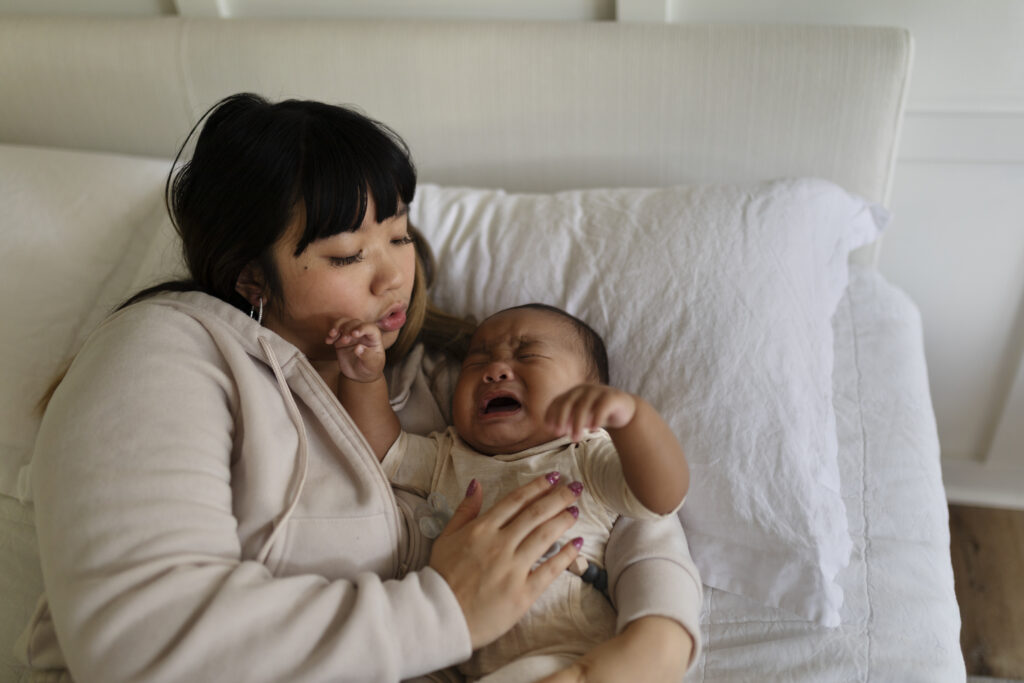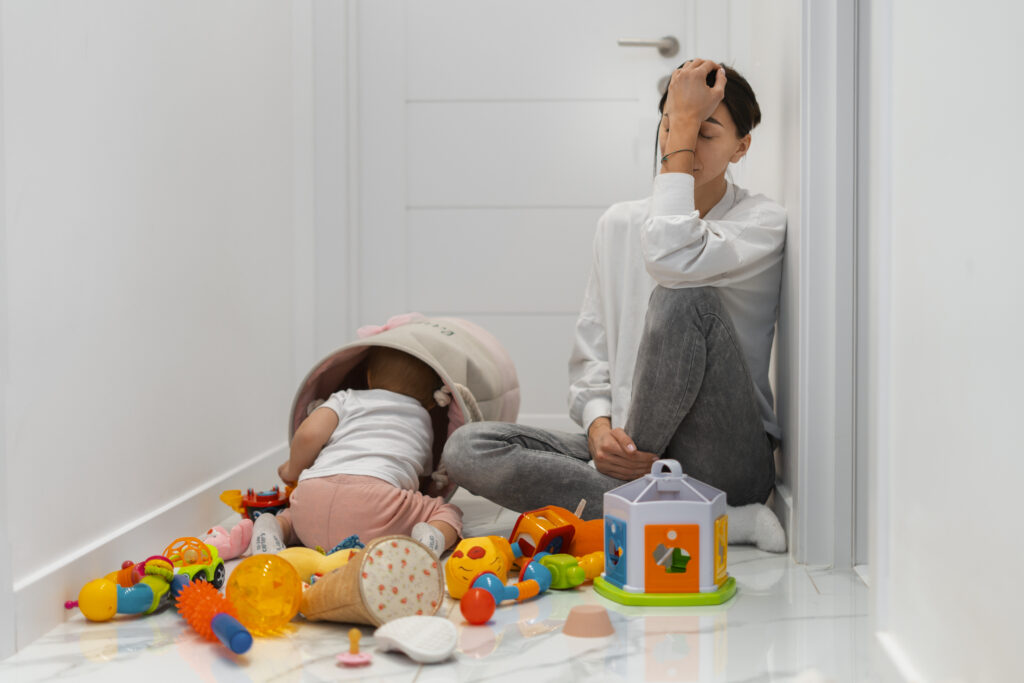Recognizing Postpartum Depression Early Signs and Finding the Right Support in Pakistan
After childbirth, many mothers expect joy, but what if that joy doesn’t come? There’s a quiet expectation that new motherhood should feel magical from the start. But the reality can feel very different for many women, especially first-time and second-time mothers in Pakistan.
In Pakistan, emotional health after childbirth is rarely discussed, and when it is, it’s often brushed aside. That leaves many mothers feeling isolated, confused, or even ashamed for struggling during what’s “supposed” to be the happiest time of their lives. Global health data suggests that around 1 in 7 women experience postpartum depression, with even higher rates reported in low- and middle-income countries, including Pakistan. This guide gently walks you through the early signs of postpartum depression. It shows you where to find trustworthy, confidential support right here in Pakistan, because feeling better is possible, and you deserve to be heard and helped.
Quick information in this blog
What Postpartum Depression Really Looks Like?
- Postpartum depression isn’t always obvious and can appear differently in each mother.
- Some women may feel persistently sad or cry often without a clear reason.
- Others may feel emotionally numb, as if they’re just going through the motions.
- You might find it hard to bond with your baby or feel disconnected.
- Simple daily tasks can become confusing or overwhelming.
- You may feel like you’re failing as a mother, despite trying your best.
- If these feelings last more than two weeks or grow stronger over time, it’s more than just “baby blues.”
- Many women feel ashamed to speak about it, especially when society expects them to feel joyful.
- Postpartum depression is a real medical condition, not something you’ve caused.
- Recognizing its signs and accepting your feelings is the first step toward healing, you are not alone.

Common Signs You Shouldn’t Ignore
Feeling a bit tired or emotionally drained after giving birth is quite normal, but if these feelings keep coming back or get stronger, then it’s time to pay attention. The signs of postpartum depression can be very different from what we normally associate with it, such as nonstop crying. It may be a kind of muted feeling, a sense of going through the motions with your baby, or even waking up with a heavy heart.
Honestly, it could become annoying, and you would not even know why, it would just seem like small things were making you get angry and they would keep coming. You might be feeling guilty for not enjoying the time as much as you think you should or, even worse, you might just find yourself withdrawing from the people around you suddenly.
These are not just the signals of a tired new mom, they could be the signals that your body and mind are out of balance because of this situation. The earlier you become aware of them, the more easily you will be able to get help and feel better. You are not lacking in strength. You are not isolated. The only thing is that you also deserve to be taken care of, not just as a mother, but as a whole person who is healing, adjusting, and quietly carrying so much each day.
Where You Can Get Help and Support in Pakistan?
If you’re feeling unlike yourself after childbirth, know this, help is available, and you don’t have to go through it alone. In Pakistan, more awareness is slowly growing around postpartum mental health, and that means some people understand what you’re feeling. Start with your gynecologist or family doctor, they can guide you to a mental health professional who has undergone treatment with new mothers. Many large hospitals in cities like Lahore, Karachi, Sialkot , and Islamabad now have psychologists on staff. You can also reach out to support groups online where other moms share their stories. Talking to someone you trust , a sister, friend, or your spouse , can also be a first step. You’re not weak to be in need of support. You’re strong for seeking it, especially when it’s for both your healing and your baby’s well being.
What does Postpartum Depression feel like?
Postpartum depression is not always the case when a woman is crying without stopping. It may come to the surface in the form of constant tiredness even after sleep, or lack of feelings when you are expected to be happy. You may be finding yourself losing your temper quickly or feeling guilty because everyone around says that it should be the “happiest time.”
Nevertheless, inside of you, it might be the case that you are feeling alone, anxious, or disconnected from your baby.
In some mothers’ words, it is like a fog that they just cannot get rid of or a weight that is there silently on their chest. The situation becomes even more confusing as no one is talking about it around you. To be clear, it is not about being weak or ungrateful, it is a very real condition, and it can affect anyone. Acknowledge the way it trips you is the initial step along the road to recovery. You are not broken, and nobody is there with you.

Why Talking to Someone Can Make All the Difference?
As a doctor, I’ve seen firsthand how powerful a single conversation can be for a mother going through postpartum depression. When you talk to someone, whether it’s a trusted family member, a friend, or a healthcare provider, you allow yourself to breathe. You stop carrying the weight alone. I’ve had new mothers sit in my office unsure of what they’re feeling, afraid to say it out loud. But once they do, there’s often a sense of relief. You realize you’re not broken, you’re human, and you’re allowed to struggle. Talking doesn’t fix everything overnight, but it opens the door to support, understanding, and healing. You don’t have to go through this in silence. You deserve to be heard, and more importantly, helped, with kindness, not judgment.
Losing Interest in Things You Once Loved
There’s a quiet sadness that creeps in when the things that once brought you joy, your favorite show, chatting with friends, even holding your baby, suddenly feel distant. You’re going through the motions, but something feels missing. You might wonder, “Why don’t I feel like myself anymore?” This isn’t laziness or being ungrateful. It’s a real emotional shift that many mothers face after giving birth. You’re exhausted, both in your body and mind, and it’s okay to admit that. This loss of interest doesn’t mean you don’t care, it means you need support. You’re not broken. And you’re certainly not alone. With the right help, whether it’s a kind conversation or professional guidance, that spark you’ve lost can come back. One small step at a time.

Feeling Overwhelming Sadness and Fatigue
After childbirth, many mothers experience a deep emotional heaviness that goes beyond physical exhaustion. The sadness can feel constant, settling in like a fog that doesn’t lift, no matter how much rest or support surrounds you. Tasks that once felt simple, getting dressed, making a cup of tea, and holding a conversation, now feel draining. Fatigue takes over the body, not just from lack of sleep, but from carrying the emotional weight of everything at once. Even joyful moments may feel distant or muted. It’s not about strength or weakness, it’s about what your body and mind are going through. These feelings are real and valid. Recognizing them is not a failure; it’s the beginning of healing. With the right support, brighter days can gently return.
Final Thoughts
If this message has made you feel down, I want you to stop reading for a moment and acknowledge that you are not alone. I have seen this with my own eyes among new mothers throughout Pakistan. You’re not weak, and you are not failing. You have been through a lot, and it’s alright to accept that some days have been too much. It’s important to reach out for support when you need it, whether from friends, family, or a professional. Remember, taking care of yourself is just as vital as caring for your little one.
It’s important to remember that vulnerability is a sign of strength, not weakness. Allow yourself to feel and express what you’re going through; it’s a crucial step toward healing and finding support in those who care about you. However, you have to hear that nobody is going to weaken you if you ask for help; you are actually at the start of your healing process. Confide in someone. Talk to a doctor. Share your feelings with someone.
This is only a small part of the story of your motherhood, and not the whole. You’re still that strong woman even though you don’t feel it right now. And of course, you will eventually feel better. Take it one step at a time.
FREQUENTLY ASKED QUESTIONS
How do I know if it’s postpartum depression or just baby blues?
If your low mood lasts more than two weeks and feels heavy or worsening, it might be postpartum depression.
Is it normal to feel disconnected from my baby?
Yes, many mothers experience this. It’s a common sign of postpartum depression and doesn’t mean you’re a bad mom.
Can postpartum depression start weeks after giving birth?
Absolutely. It can begin anytime within the first year after delivery.
Can I recover from postpartum depression without medication?
Some mothers do with therapy and support. But a professional can guide you to the best option for your healing.